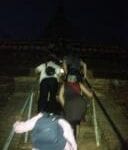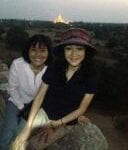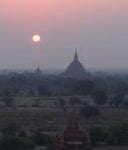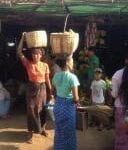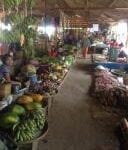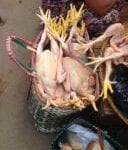Written by Thu Tran, MD,FACOG
May 7, 2014
Before dawn, we climbed the steep steps to the Shwesan Daw temple. It was supposed to be the spot to be in Bagan to see the sunrise. At the top of the steps, I walked around to look at the grounds surrounding the temple. Even in the dark, I could see numerous temples around Shwesan Daw.
The sunrise was not majestic, because the sun was hidden behind the clouds. Still, it was a beautiful moment as the horizon turned a bit orange and pink. I could hear Buddhist chanting in a temple behind me and I suddenly thought of my mom. I wished my mom could see these sacred grounds of Myanmar, as she was Buddhist. Maybe my mom was witnessing the sunrise with me that day? I was overcome with this unexpected sadness, almost like nostalgia. I had never been in Bagan but, somehow, I thought I had known Bagan. This was the kind of serenity I was looking for these past two weeks with the whispering sounds of human voices, drowned out by the songs of the birds at sunrise. There were no massive crowds rushing through the grounds on the way to work or to get to the clinic. It was in the emptiness of this “Field of God” that I found peace.
Where has this ancient civilization gone to? What has happened to the minds and work of those brilliant and creative people who built the temples? Why did Myanmar retreat from its advanced civilization? You can’t blame it on God. Was it God’s will; or was it the will of a handful humans which took the country backward? Myanmar could have progressed like China, or Korea, or at least, Vietnam.
Later in the day, we went to a day market where Mylène, Sophie and I bought some colorful pants with the typical local print patterns of flowers and elephants, and some simple crafts. I found my puppet, a lady puppet in a pink outfit. At first, I told the vendor I didn’t like the fact that the puppet was holding a long sharp sword in her hand, making her look violent. The vendor immediately pulled out the sword, leaving the hand of the puppet with a hole.
“Now, there is no sword.” She was beaming, as her husband was looking on, nodding his head. In this market, vendors would do anything and everything to sell their items.
I was horrified, telling her I would rather have the puppet holding a sword than having a hole in her hand. How am I going to explain this hole to Sandy when I come home? I asked her to put the sword back into the puppet’s hand.
“You want a woman warrior? She is a woman warrior!” the vendor was puzzled.
A woman warrior? She could have explained that to me from the beginning. This puppet was the symbol of the many Myanmar women I had met during my stay. The women of Myanmar, in my eyes, were all warriors. How would they have survived their fate otherwise?
After the trip to the Bagan market, we got back on the bus for another long ride back to the Amara hotel in the new capital Naypyidaw. We reached the hotel after 8:30 p.m. and everyone was so exhausted, partly because the air conditioning on the bus had not been working at all. The room where I stayed with Mylène that night had no mosquitos and the air conditioning worked well. How did that happen? I was jealous of those who had been in that room for the prior four nights!
For dinner that night, we got to eat at the hotel’s restaurant. The food was so much better than at the chain restaurant “The Feel” or “The not Feel so good” as I called it by now. The team leader asked each of us to share how we felt about the trip. Everybody was gracious. It was a long two weeks of hard work in the extreme heat but, I agreed with Frank, we took away more than we gave.
I remember the day before I left for the trip, a Friday that I luckily was off from work. I am off every third Friday. I drove frantically to different places to buy items needed for the trip. My last stop was at a Verizon store in Rockville where I wanted a technician to show me how to work my iPhone in Myanmar, how to turn off the roaming function and use the iPhone as my camera. My suitcase had no room for a big camera. My friend Ann showed me how to download and set up the “Viber app” so that I could text or maybe even call home for free. I wanted to make sure all the information was accurate.
In the restroom of this Verizon store, I saw a beautiful poster of a group of rowers. The background of their boat was a stunning, colorful sunset. Below the poster was a quote in bold letters:
“Coming together is a beginning. Keeping together is progress. Working together is success.”
I was smiling inside. I thought the poster was a perfect message for me, as I was about to embark on a trip with many colleagues I was meeting for the first time. Who would have thought I would find such wisdom even in a restroom?
As I glanced at the group, I realized how different many of us were. Some were young and not always mature, some too serious or quiet, some really witty. Together, however, we were a family of many different personalities, dysfunctional at times, but who travelled with the same goal of helping those less fortunate than us. We lived together and accommodated each other like the people of the city of Tijuana, Mexico – another story I heard on National Public Radio on the Friday before I left. In this city bordering Mexico and San Diego, people from both sides of the border appreciate the harmony they have created for the two communities. They accept the differences between themselves and their “next door” neighbors. A physical “border control” barrier exists, a high wall with barbed wires, created by the two governments, but people manage to look beyond it. I was moved to hear how some families would come to this barrier to have conversations with their loved ones on the other side of the border. In one instance, an adult son, an illegal immigrant working as a painter, reunited with his parents for the first time in ten years. Why do humans create so many unnecessary barriers, I wondered?
The last morning in Myanmar, Mylène and I woke up early for our final run before boarding the bus for the last long ride to Yangon. My suitcase was lighter than when I had arrived, as I had given away all of my T shirts and most of my pants to different people in Myanmar, a strategy I planned at home. In Yangon, before going to the airport, the driver will get my last T-shirt and my black shoes. David should be pleased, I said to myself, as he always complains I have too many pairs of black shoes. Men will never understand how there are never too many black shoes or too many black dresses!
I was at the breakfast table that morning telling my fellow mission colleagues how I thought our hotel supplies were “strange,” how they gave us bath gel yet there was no bath. Why was the bath gel there? I started rambling on about Jean Paul Sartre and his existentialist theory of how essence precedes existence, how the bath gel is there before the building of a bath. From the way people were looking at me, I could tell that they thought I could use some psychotherapy. Obviously, not everybody read Sartre in college.
“I didn’t think like you. I just used it as shower gel.” Dominic laughed. I realized I should stop trying to explain to them the meaning of Sartre’s play “Huis Clos” or “ No Exit,” as they would probably think I should have been somewhere in solitary confinement.
The truth was, I think I understood Sartre. He was not “Godless.” He was debating with society the role of God in our lives. He, unlike many of us, couldn’t accept blind faith. He refused to rationalize about why there was so much sorrow without any divine intervention that he witnessed in his lifetime. He couldn’t ignore all the absurdities around him and still believe somehow, one’s misery eventually will be rescued by a great being. Like a practical man, he did not wait for things to happen; he made things happen. One is responsible for one’s action, he used to say. One of his main theories was about how heaven and hell are right here with us. You don’t have to die to be in hell. “Hell,” Sartre said, “is the others.” You are a hero or a coward depending on how others see you, as simple as that. “L’enfer, C’est Les Autres” or “Hell is the others” was among the most famous lines in his play “No Exit.”
I finished my breakfast without asking my colleagues if any of them had read “Waiting for Godot” or, in French, “En Attendant Godot” by Samuel Beckett, another leading author of existentialist works, because I knew I would be sitting alone at dinner for the rest of the trip. I didn’t tell them how, several years ago, I saw this Beckett play with David at the Kennedy Center in Washington D.C., and how the blue moon on that stage haunted me for quite sometime. The play was full of symbols about hope, blind faith, and the contradiction of human existence and salvation. Having blind faith might be a better way for some people to navigate through this difficult world, because it allows them to ignore or greatly diminish their worry and fear. It is like Linus in Charlie Brown holding his security blanket sitting next to a wolf. It is like the two homeless men, Vladimir and Estragon in “Waiting for Godot” who come every day to the same spot, a possibly dead willow tree, to wait for this man “Godot,” who never comes. The only person who comes is a little boy, a messenger and Godot’s servant. The boy informs the homeless men that Godot will not come that day. The two men continue to show up, silently standing by this tree of life, the link between heaven and earth, but Godot never comes to meet them.
After breakfast, we boarded the bus for our last long ride in Myanmar, from Naypyidaw the new capital, to Yangon the old one. The ride got more uncomfortable as the temperature started rising in the bus. I sat behind Dominic and Sophie and tried to distract myself by blogging on my iPhone about the previous day. I had to stand up now and then to get some air from the windows in front of my seats. Most people were watching the same Persian movie I believe we watched on the way to Taunggyi. It was a love story between a beautiful rich girl who was to be married to a British gentleman but ended up falling in love with a poor man who was a dancer. I hope I am not getting all the details wrong, because I only glanced at the screen now and then. Sophie the Canadian family doctor and Frank the gastroenterologist were laughing at me for not being able to keep up with the movie. It seemed this movie had similar scenes to some big Hollywood hits. In one scene, the love birds were dancing on the field. It looks just like “The Sound of Music,” I told myself. In another scene, people were dancing in a train station and I swore I couldn’t tell the difference between that scene and a similar scene in “Slum Dog Millionaire.” The last dramatic scene was the “Dirty Dancing” act between the love birds, reminding me of Patrick Swayze. How many years have passed since Patrick died of pancreatic cancer? This Persian movie sure kept me distracted for quite a few hours, as the story never seemed to end.
It would have been better to see something like “Schindler’s List,” I said to myself. If we wanted more action, “The Godfather” would have been what I would have chosen. At least, the music would have been beautiful even if I didn’t watch the movie. Who wouldn’t have loved to hear the romantic lyrics from the song “Speak Softly Love”?
“Speak Softly, Love and hold me warm against your heart
I feel your words, the tender trembling moments start
We’re in a world, our very own
Sharing a love that only few have ever known.”
Who would have forgotten the very last scene when Al Pacino was sitting alone on the bench staring into space? I was young and naive when I watched that movie. Still, however, I remember how poignant that last scene was. I was wondering what went on in his mind, Mr. Michael Corleone, at the end of part 3 of “The God Father,” when he was alone on that bench. Did he have everything he wanted, or did he lose everything he needed?
I survived the bus to infinity, but was disappointed that, by the time we got to Yangon, it was too late to have a tour of city as planned by the group’s organizers. We had only enough time to have our last bowl of noodles from Myanmar before getting ready to leave for the airport. The streets of Yangon that afternoon were so busy, as people were ready for the “Water Festival” in preparation for their new year. Myanmar was ready to celebrate another new year on April 18. I reached out the window of the bus as it stopped at a red light and bought four strings of Jasmine leis from a little boy, all for a thousand Kyat or a dollar. My fellow mission colleagues were laughing as I shared my jasmine leis with them, but I was glad I could help another young vendor at the last minute in Myanmar. I was happy I had only a few thousand Kyat left in my backpack. I had to spend them all at the airport.
Tags:

